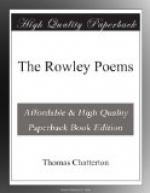V. NOTES.
1. The Tournament, lines 7-10.
Wythe straunge depyctures, Nature maie nott yeelde, &c.
‘This is neither sense nor grammar as it stands’ says Professor Skeat. But Chatterton is frequently ungrammatical, and the sense of the passage is quite clear if either of the two following possible meanings is attributed to unryghte.
(1)=to present an intelligible significance otherwise than by writing—as ‘rebus’d shields’ do (un-write);
or (2) = to misrepresent (un-right).
With pictures of strange beasts that have no counterpart in Nature and appear to be purely fantastic (’unseemly to all order’) yet none the less make known to men good at guessing riddles (’who thyncke and have a spryte’) what the strange heraldic forms express-without-use-of-written-words (’unryghte’)—or (taking the second meaning of unryghte—misrepresent) present-with-a-disregard-of-truth-to-nature.
2. Letter to the Dygne Mastre Canynge, line 15.
Seldomm, or never, are armes vyrtues mede,
(that is to say, coats of arms)
Shee nillynge to take myckle aie dothe
hede
i.e. ‘She unwilling to take much aye doth heed’; ‘which is nonsense’ says Prof. Skeat. But the sentence is an example of ellipse, a figure which Chatterton affected a good deal, and fully expressed would run ’She—not willing to take much, ever doth heed not to take much’, which would of course be intolerably clumsy but perfectly intelligible.
3. AElla, line 467.
Certis thie wordes maie, thou motest have sayne &c.
Prof. Skeat ‘can make nothing of this’ and reads ’Certes thy wordes mightest thou have sayn’.
A simple emendation of maie to meynte would give very good sense.
4. AElla, line 489.
Tyrwhitt has sphere—evidently a mistake in the MS. for spere which he overlooked. It is not included in his errata. In the 1842 edition the meaning ‘spear’ is given in a footnote.
5. Englysh Metamorphosis.
Prof. Skeat was the first to point out that this piece is an imitation of The Faerie Queene, Bk. ii, Canto X, stanzas 5-19.
6. Battle of Hastings, II, line 578.
To the ourt arraie of the thight Saxonnes came
Prof. Skeat explains ourt as ‘overt’ and observes that it contradicts thight, which he renders ‘tight’. But really there is not even an antithesis. Ourt arraie is what a military handbook calls ‘open order’ and thight is ‘well-built’, well put together (Bailey’s Dictionary). The Saxons were well-built men marching in open order.
VI. APPENDIX.
BRIEF SYNOPSIS OF THE ARGUMENTS USED IN THE ROWLEY CONTROVERSY.
(Taken mainly from Gregory’s Life of Chatterton.)




